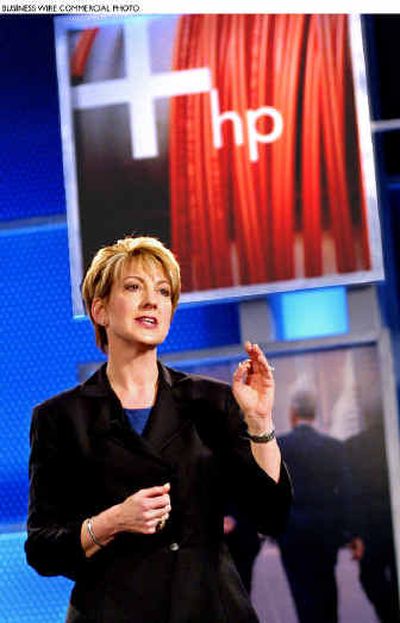Insiders: Fiorina’s fall is no surprise

SAN FRANCISCO — Carly Fiorina’s bold orchestration of the Hewlett-Packard-Compaq merger dramatically boosted her Wall Street profile and brightened her political star from Sacramento to Washington.
But as an HP outsider recruited to slash thousands of jobs and shake up HP’s clubby atmosphere, many employees despised her as a liberal arts management wonk devoid of engineering expertise.
Now, the company’s directors have dismissed her for not meeting their voracious appetite for profit and revenue growth.
The polished but forceful executive didn’t make it easier for herself during negotiations to acquire Compaq Computer Corp. in 2002, when she alienated Walter Hewlett, the son of one of HP’s late co-founders and the only relative serving on the board, and other founder family descendants.
Fiorina used her media savvy and Wall Street connections to steamroll Hewlett, but her decision to acquire Compaq may have sealed her fate.
Those who know Fiorina, 50, say they’re not surprised she got fired.
The daughter of a painter and law professor who was frequently uprooted as a child, she’s known for relentless drive, lightning-fast decisions and a management style that emphasizes personal accountability over consensus-driven decision-making.
Fiorina, who touts “The Art of War” by the ancient Chinese general Sun Tzu as her favorite book, isn’t afraid to blame individuals or declare enemies.
When she arrived at HP in 1999, after executive sales posts at Lucent Technologies Inc. and AT&T Corp., she centralized 83 units into less than a dozen. She promised profit growth of at least 12 percent a year.
But after the dot-com collapse of 2000, Fiorina became one of the most bearish executives in Silicon Valley, warning that the technology sector couldn’t deliver the profits of an emerging industry.
In August, when she learned HP would fall short of its expected quarterly profit, she held a 5 a.m. conference call and fired three vice presidents for “unacceptable performance.” In the year after the merger, she laid off roughly 18,000 workers.
“She’s unwilling to let anyone slide into a comfort zone. She made employees uncomfortable because it was obvious she had no room for slackers — that’s how she could take HP and totally turn around its culture, turning it from a country club environment to a lean, serious company,” said Carl Claunch, vice president of research at Stamford, Conn.-based Gartner Inc.
She also astonished Silicon Valley workers by becoming what they call a “Benedict Arnold CEO” — an executive who’s eager to transfer U.S. jobs to low-wage workers abroad to save money. In January, she urged the Bush administration not to impose new trade restrictions, warning that such a move would curtail American companies’ global competitiveness.
“There is no job that is America’s God-given right anymore,” Fiorina told Congress. “We have to compete for jobs.”
It’s unclear whether resignation will lead Fiorina toward politics or even a run for public office, which she’s been rumored to covet since relocating to California in 1999. In October 2003, she served on Gov. Arnold Schwarzenegger’s bipartisan transition team, then became one of his first advisers.
Ralph Hellmann, senior vice president of government relations for the lobbying group Information Technology Industry Council, organized a lunch last year that featured Fiorina as a keynote speaker. Eight Republican chairmen of congressional committees attended. She also met with President Bush; former President Bill Clinton; House Speaker J. Dennis Hastert, R-Ill. and other top congressional leaders.
“When she came to Washington she cut a broad swath,” Hellman said. “Everyone recognized her and wanted to meet with her.”
Despite being one of corporate America’s most influential women, Fiorina always seemed slightly uncomfortable with the distinction.
She generally refused to engage in conversations about the role of women in the workplace and she adamantly told reporters and analysts that her title was “chairman,” not “chairwoman” or “chairperson.”
Still, Fortune magazine named her the nation’s Most Powerful Businesswoman every year since the list began in 1998 until 2004, when she was bumped to No. 2 by eBay Inc. chief Meg Whitman.
And she still holds the titles of New York Stock Exchange and World Economic Foundation director.
Larraine Segil, an expert on mergers and acquisitions partner with Boston-based consulting firm Vantage Partners, called Fiorina’s departure “a hugely disappointing move for women in high places.”
“A powerful, strong and focused leader, with firm views and great courage, pushed aside because she took risks and did what was unpopular — downsized, refocused, repositioned,” Segil lamented.
“Carly is a woman of substance, vision and capability. Is she stubborn? Perhaps. She is convinced that her approach needs time to work and wanted unrestrained commitment by a board to support that for the long term.”